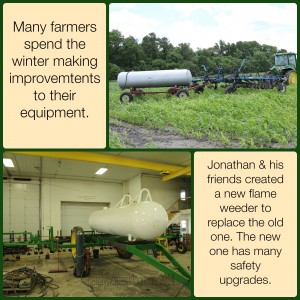My Twitter feed is increasingly making me crabby. I follow a pretty diverse group, both conventional and organic farmers, a variety of agriculture businesses, and a wide range of bloggers. Why is it that every morning, my twitter feed is clogged with more conventional farmers putting down organic agriculture? The organic farmers I follow don’t share near the non-GM stuff as what the conventional farmers are sharing. Even some people that work for groups that are supposed to support all of agriculture are sharing more anti-organic graphics. I thought that when you claim to be an “agvocate”, you would be speaking for agriculture, not pitting one method against another.
I belong to a speakers group through the Minnesota Farm Bureau called Speak for Yourself. In our training sessions, we are taught to tell our farm story through the use of Power Point presentations. We are given the opportunity to create our presentations, then give them to our class for practice. We are to focus on our farm, and not worry about what our neighbors are doing. That way, when we go out and speak to groups like a Lions Club or Rotary Club, we are putting a face on farming. We are taught to present a positive picture of agriculture, and to be a resource to those who we have shared our story. As an organic farmer, I have been able to give my presentation to a group that had quite a few Monsanto employees in it. They enjoyed the presentation because I focused on my farm, without putting any commentary about other farms into my presentation. This is proof that speaking about only my farm can bring a clear message.
Do you hear a lot of people talking about the Paleo diet, vegetarianism, veganism, the Whole30 Challenge, and other restrictive diets? Why is it that those diets are acceptable, yet people who choose to eat organic foods are called anti-science? Last time I checked, it was not advised to go on a diet that eliminates whole food groups or are too restrictive. There are many scientific articles relating to the long term viability of vegan diets, for example. If I were to follow in other farmer’s footsteps, I could post a graphic that I found on the internet. After all, whatever is on the internet has to be true, right?
[youtube=http://youtu.be/v_CgPsGY5Mw]
A few of my friends have told people that they can go ahead and waste their money by paying extra for the organic label. Really? How is that attitude fostering a positive image of agriculture? These same people are so excited when the farmers market opens and they can finally get fresh produce. I’m sure you could get tomatoes from the grocery store for less. So what if they are a little more pale and pulpy than the organic ones, or the ones fresh from the farmers market. Sounds a little bit hypocritical to me. No wonder consumers are confused.
Speaking of consumers, I see a lot of the anti-organic graphics and studies aimed at them. Talk about mommy guilt. Conventional farmers are just as bad as organic farmers if you really look at the graphics being shared. Why is it that only the end products are looked at when people are arguing over methods? Isn’t there a grower in there somewhere that is preparing the soil, buying seeds, planting, nurturing, and harvesting? In my mind, there is a whole lot more to these systems than just the end product.
This brings me back to the whole organic farmers are anti-science statements that make me cringe. We are anti-science because we choose not to use a certain seed technology? What the heck? That is such an insult. We use science to determine what our soil profiles are, how much manure needs to be applied, how much nitrogen the corn plants are taking up, when to flame weed the corn, and what tillage methods we need to tweak. We use more technology in our tractors than most of our neighbors. So, using the same logic, we can call all farmers who don’t use GPS guidance systems and field mapping anti-technology, backwards, and old, right? Why is it that conventional farmers feel the need to call others names because they farm different? It sounds a lot like school yard bullying, and makes us all look stupid.
Why is it so hard to resist hitting the share button when you know it’s going to hurt your farming friends and neighbors? You tell your story, I’ll tell mine, let other farmers tell theirs. When we start to tell each other’s stories, the whole agriculture message gets all mucked up, and consumers don’t know who to trust. We need to resist the temptation to post things that prove we are “right”. Who says that anyone is wrong? What is right for you will not be right for me. Even if we farmed using the same methods. Your soils, climate, personality…everything about you is different than me. That is what is awesome about being a farmer in the US. We have the freedom to farm how we like. We have the freedom to grow what we want. We have markets available to sell our products. There is so much good happening in agriculture, why is it that we feel like we need to put others down?
Let me leave you with one of my favorite quotes:
“To be one, to be united is a great thing. But to respect the right to be different is maybe even greater.” -Bono
